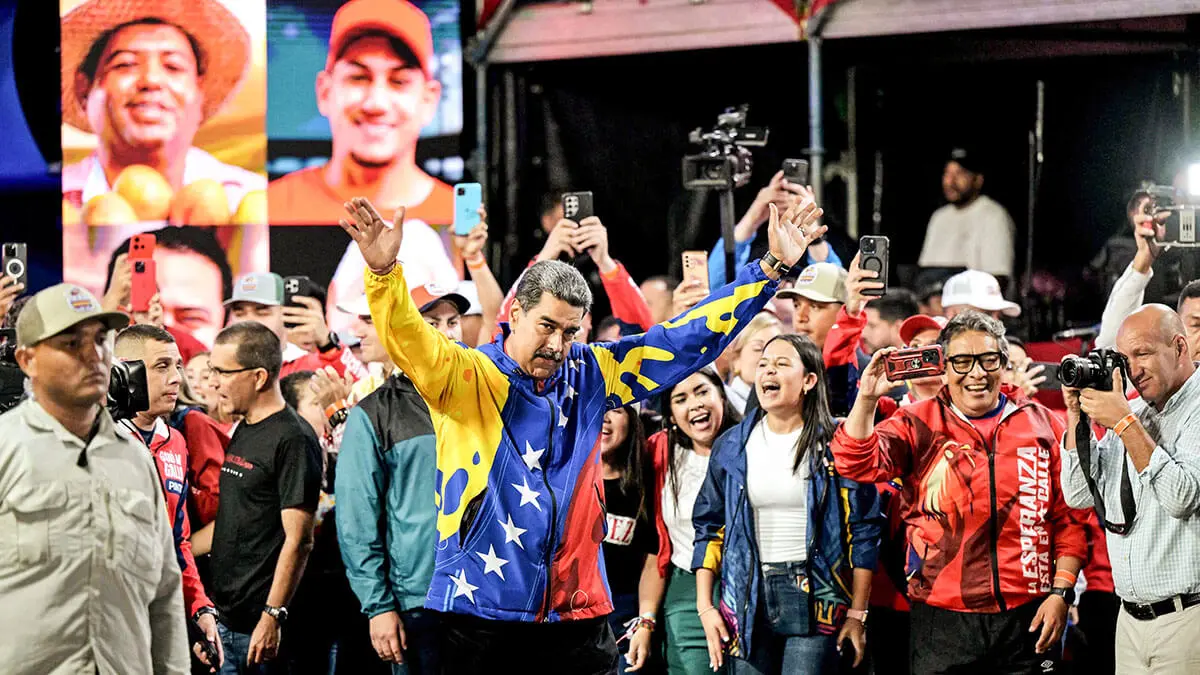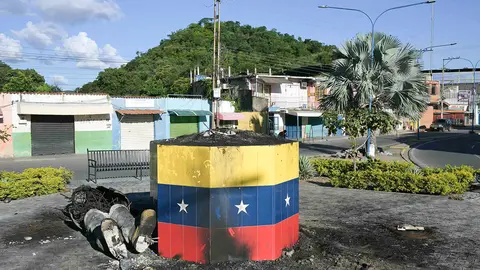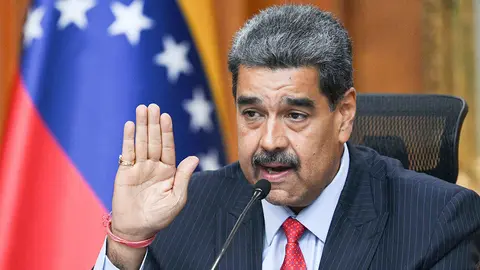Russia, China and Iran back Maduro's government

In this publication, González reproaches Zapatero for being the only member of the Puebla Group to go to Venezuela for the elections on 28 July and not demanding a review of the results.
In this regard, González points out that other leaders, also linked to the Puebla Group, such as the former president of the Dominican Republic, Leonel Fernández, have demanded the publication of the results, but the former Spanish president has not done so.
"Venezuela's National Electoral Council, loyal to the hitherto president, Nicolás Maduro, maintains that he obtained 6.4 million votes, compared to 5.3 million votes for his rival Edmundo González Urrutia. The opposition, on the other hand, argues that, according to the results it managed to compile, its candidate was the winner with 6.2 million votes compared to 2.7 million votes for the dictator Maduro".
"González considers that the election results in Venezuela should be verified by an independent international organisation and warns that this should be done soon, because, he maintains, Maduro's government is trying to alter the system, ballot by ballot, by means of a Chinese group", according to the aforementioned newspaper.
When asked about this, Julio Borges, former president of the Venezuelan National Assembly, described the role of former president Zapatero with regard to the minutes in Venezuela as shameful and pointed to him as a kind of lobbyist with an influence to connect businesses.
"These people do not believe in ideas, nor do they believe in political mysticism; what they believe in is simply power and business, and this is how they are operating in the different countries in a network of interests linked to power and business that maintains this type of system," said the prominent Venezuelan politician.
More than ten days have passed since the elections held in Venezuela and the electoral records have still not appeared, which would only serve to demonstrate the fraud committed by the dictator Nicolás Maduro, who seeks to trample democracy even further, ignore the will of the majority of voters and perpetuate himself until 2031.
Borges, exiled in Madrid, explains that Maduro's entire fraud was designed around making it practically impossible for the Venezuelan opposition to have the minutes of each of the 30,026 polling stations in Venezuela.
"His idea was that we wouldn't be able to put together the jigsaw puzzle of the tally sheets and thus give himself as the winner. What he didn't count on is that the citizens' organisation, the popular organisation, allowed the official reconstruction of the voting records and those records give a controversial result where the difference between Edmundo González and Nicolás Maduro is a difference of 40 percentage points," he says with conviction.
Borges, who was a deputy for Miranda in the Venezuelan National Assembly in three different periods, points out that the opposition already has 85% of the official tally sheets "they are not a quick count" and reflect that Maduro lost the election.
"We are in a situation in which they want to create a kind of big swamp around the tally sheets and create a fight over the tally sheets. And for us, honestly, it is an issue that the world has understood and that Maduro has not been able to explain satisfactorily to anyone," he says hopefully.
If this is rolled back, as we are already seeing, what will happen to the election result? Because the virtual winner is Edmundo González Urrutia...
What I want to say is that for Maduro there is no option, there is no longer the chance, to show that he achieved some kind of electoral victory... we don't want to engage with him in a kind of legal battle because there are no free institutions, that would be totally suicidal; to give you an idea, the vice president of the court where the electoral dispute is being settled is the brother-in-law of Cilia Flores, Maduro's wife.
The founder of the Primero Justicia party denounces the nepotism that prevails in his native country: "There is a corrupt nepotism that is in all the institutions, so we must not get into that labyrinth; secondly, Maduro effectively completed what we can call a self-coup to disregard the popular vote in Venezuela".
So the strategy is clear for the opposition: maintain internal pressure and gain external support. Borges is aware of the risk because the internal citizen pressure in Venezuela is suffering enormous repression, and there is fear. "Maduro's repression of the population is comparable to any other totalitarianism we have known in history".
Since 28 July, the date of the elections, there have been daily demonstrations of citizens demanding respect for the popular will of a majority that gave the victory to Edmundo González Urrutia. "There are more than 1,500 people detained, 50 people missing and 23 people dead".
The situation is chilling with severe controls at airports to withdraw passports from people identified as opponents of the regime as well as inspections of citizens in the streets who are subjected to bribes to avoid arrest. "There is a huge citizen round-up".
In this regard, Borges' denunciation goes further: "In the most popular part of our neighbourhoods they are developing a plan to arm paramilitary groups to control citizen protest".
You talk about external pressure but it seems to matter little to Maduro considering that he is supported by Russia and China, for example...
The countries that have supported Maduro are completely from the totalitarian quadrant; immediately, hours after the fraud, China and Russia supported Maduro and then there were other countries like Iran, Cuba, Bolivia, Nicaragua, Belarus... all those anti-Western and anti-democratic countries of the world. But the free Western countries are strongly supporting democracy in Venezuela. On this international front, a kind of possibility of reaching an agreement or some kind of negotiation has opened up, for example with Colombia, Mexico, Brazil.
Borges, who is facing five prison orders from Spain, at the request of Maduro's dictatorial regime, places the context of interests interwoven around Venezuela.
In the middle of this totalitarian quadrangle, Russia has been accused by several countries, especially here in Europe, of trying to intervene and influence their respective elections, are there suspicions that Russia could be behind Maduro's fraud?
-Maduro's fraud has zero sophistication. It is absolutely vulgar and primitive. Practically the president of the electoral arbiter who is a friend of Maduro's was handed a piece of paper with the data he had to say and that's what he did: he read it and left. They have not presented any more accounts so far.
What should be stressed, Borges adds, is that behind Maduro is a very well-planned mechanism where Russia, China and Iran know the strategic value of having a country like Venezuela on their side. "We are talking about an economy that has a quarter of the world's oil reserves and has the eighth largest gas reserves in the world; and, at the same time, a country that is strategically located in a privileged position for the Caribbean, Central and South America".
It has to be seen as a much more global plan, which Borges explains as follows: "They are behind it, both China, Russia and Iran, trying to destabilise the hemisphere where the United States and Europe have a natural relationship. We have, for example, that Russia, together with Cuba, are responsible for Maduro's security rings. All of this is managed by Cuban personnel with Russian advice.
There is also an alignment in the anti-Western narrative that the Caracas-born politician frames in terms of the need for these countries to have a space to operate in Latin America and for Venezuela to become their headquarters. "From there they radiate to the Caribbean and to countries such as Bolivia and Nicaragua and develop a whole anti-democratic and anti-Western policy in order to have an enormous influence and break the natural spaces of the United States and Europe".
"Immediately after these totalitarian countries recognised Maduro on Monday 29 July and called on us to recognise the results... a few hours later they invited Maduro as a great leader to the next BRICS meeting where China, Brazil and Iran, the latter country is joining the BRICS, are creating a power bloc that is very important to keep on the radar permanently," he said.
For Maduro, it is a great shelter that is also in his interest to have?
-Being in this totalitarian club helps Maduro to evade US and European sanctions, that is the danger.
Just at the end of December 2022, Venezuela and Russia signed eleven bilateral agreements in force for the next decade in the areas of energy, maritime transport, anti-drugs and public health.
Cornered by the issue of the electoral records, Maduro has become much more aggressive and threatening in recent days and does not seem to be backing down.
"Those of us who are Venezuelans noticed the metamorphosis of Maduro before 28 July and Maduro after 28 July; he is a Maduro who already came with all his dose of savagery and dictatorship, but after 28 July, he took a quantum leap and now the level of aggressiveness, violence and virulence does not compare to anything we have experienced in recent times", laments Borges.
In another interview, the former mayor of Caracas, Antonio Ledezma, warned of the risk of imprisonment for María Corina Machado and Edmundo González Urrutia himself; or even that something worse could happen to them...
Maduro only has brute force left and on that basis any kind of action can be expected without a doubt, and Maduro wants to project himself as an all-powerful, strong and violent dictator; in the end, he will be a character trapped in all this web of interests and contradictions. I believe that he is already in a countdown and that the strength of the Venezuelan people can unite to finish fracturing the power bloc created by Maduro in Venezuela.
But how can this be done if the army is on Maduro's side?
This is a question that you have to know how to read: the view that anyone, even in Venezuela, might have is that the armed forces are with Maduro, but if you take an X-ray of the armed forces you realise that this is not the case either.
Borges continues with his interesting explanation: "These eloquent data on the political prisoners in Venezuela, who number around 300 political prisoners, a percentage are young military personnel; that is to say, in the middle ranks of the armed forces, there is a repudiation and a whole reaction from the leaders against Maduro, what is happening is that the repression carried out by the Cubans, Russians and Iranians is truly rapacious within the armed forces".
Another fact to bear in mind that is also revealing: "In all the surveys conducted before the election, people were asked if they had a military member in their family; and if they said they did, they were asked if they were with Maduro; 75% answered that they did not support him".
And finally, Borges provides another piece of information, this time on the electoral result: "The places where it has been possible to reconstruct the vote, which are the places where the military and the family vote, the proportion of Maduro's defeat is the same as in the rest of the country; the human bulk of the armed forces are not with Maduro, although there is a leadership that is very committed to him and is involved in corruption, repression and organised crime".



